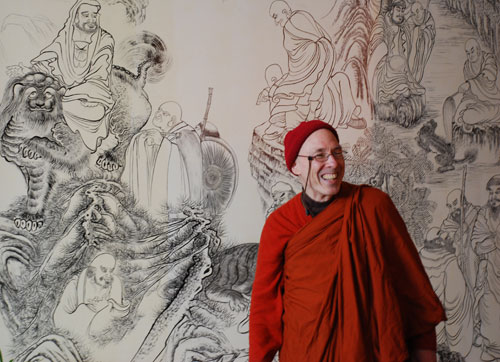
In the current issue of Parabola, Theravada Buddhist monk and teacher Bhikkhu Bodhi writes about his spiritual journey—from his solitary quest toward personal liberation to a life of politics and social action. Believing that he could most benefit the world by working on himself, Bhikkhu Bodhi retreated to a monastery in Sri Lanka, only to later discover, through contact with the eminent Ven. Nyanaponika, that the manifestations of the mental defilements which wreak havoc on both the individual and the world called for precise social investigation and the development of social conscience. He also came to notice at this time “a perceptible disconnect between the reckless courses along which the world was careening and the complacent, almost self-absorbed attitudes…among many American Buddhists”:
It seemed to me that many middle-class American Buddhists understood the ‘noble truth of suffering’ largely in terms of their own individual hangups—the ennui of material prosperity, the stress of unfulfilling relationships, discontent with their personal foibles. Outside the fold of ‘Engaged Buddhism’ many seemed barely aware of the misery that overwhelmed some ninety percent of the world’s population—misery due to poverty, tyrannical regimes, social oppression, militarism, and economic globalization. ‘Buddhist practice’ was narrowly understood in terms of one’s personal meditation, which served a largely therapeutic function. It seemed Buddhism itself was being taken up as a path to personal fulfillment rather than a means of tackling the deepest roots of suffering both for oneself and for others.
Continuing, Bhikkhu Bodhi adumbrates his vision for the union of spiritual wisdom and social activism:
In my view, what we must do to achieve our goal is to bring together the wisdom of humanity’s spiritual heritage with the prophetic passion of the social activist. It is only when the two are united—when wisdom and love inspire and drive social conscience, and when social conscience draws its guidelines from timeless sources of truth—that we can shape our institutions and policies in the ways necessary to continue the human adventure on this fragile but beautiful planet.
Read Bhikkhu Bodhi’s full article in Parabola, here.
—Alex Caring-Lobel
Thank you for subscribing to Tricycle! As a nonprofit, we depend on readers like you to keep Buddhist teachings and practices widely available.